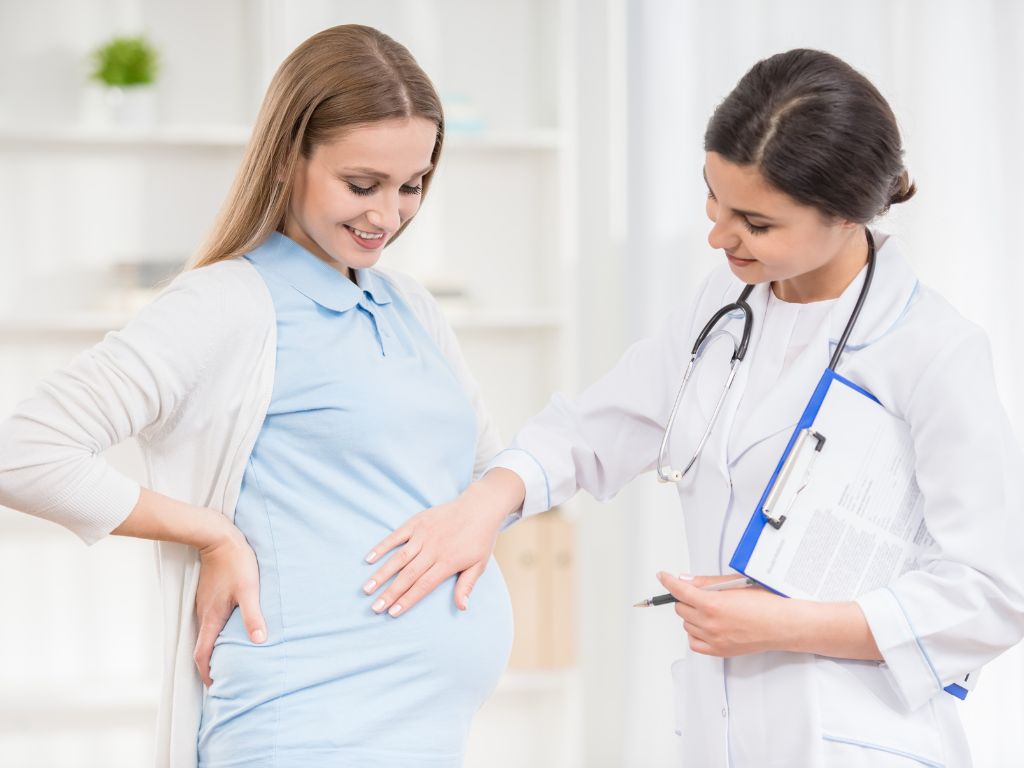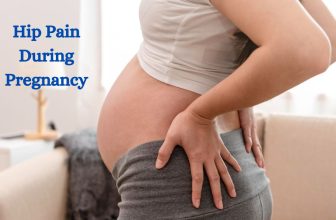Fluttering in Lower Left Abdomen in Females

Your stomach can feel various sensations throughout the day, like tugs, twists, pulls, or plucks. Most of these sensations are perfectly normal, fluttering or moving in the lower left abdomen, which can concern females.
So, what causes fluttering in the lower left abdomen in females, and what to do?
Fluttering in the lower left abdomen in females is caused by various factors such as muscle spasms, digestive issues, pregnancy, or, rarely, arterial abnormalities. Most cases are not severe, but a doctor should evaluate persistent or worsening symptoms or additional concerning signs.
This article will explore the reasons behind fluttering sensations in the lower left abdomen in both pregnant and non-pregnant females. Keep reading!
Fluttering in Lower Left Abdomen
Females who feel fluttering in their lower left abdomen often describe a sensation of movement or fluttering in that area. This feeling can vary from mild and sporadic to more noticeable and constant. It’s important to understand that fluttering without any other symptoms is typically not a sign of a serious problem.
However, if the fluttering continues, gets worse, or is accompanied by other worrisome symptoms, it’s essential to seek medical attention promptly.
Read More: Can Acyclovir Cause Yeast Infections?
Causes of Fluttering In Lower Left Abdomen
The potential causes of fluttering in the lower left abdomen are discussed below. Before the discussion, here is a table showing pregnancy and non-pregnancy-related causes.
| Pregnancy-Related Causes | Non-Pregnancy-Related Causes |
| Hiccupping | Muscle Spasms |
| Turning over | Digestive Issues |
| Stretching limbs | Ovulation |
| Flexing | Phantom Kicks |
| Kicking | Allergic Reaction |
| Intestinal Obstruction | |
| Diverticulitis |
Pregnancy-Related Causes

Graphics Credit: Robustalive.com
Fluttering sensations in the lower left abdomen can be common during pregnancy. As the baby develops and grows, their movements become more noticeable to the person carrying them. These movements are referred to as “quickening.” Generally, during the second trimester, quickening is felt between 16 and 25 weeks of pregnancy.
By the third trimester, movement should be felt regularly. It’s important to note that each pregnancy and individual may have different timelines for feeling these movements.
Potential movements during pregnancy include:
- Hiccupping: The baby’s diaphragm muscle contracts, causing repetitive hiccups that may be felt as rhythmic movements in the lower left abdomen.
- Turning over: The baby may change positions, resulting in a sensation of movement as they shift within the womb.
- Stretching limbs: As the baby grows, it may extend its limbs, leading to a feeling of stretching or gentle movements.
- Flexing: The baby may flex their arms or legs, causing brief movements in the lower left abdomen.
- Kicking: One of the most recognizable movements, kicking, can be felt as distinct jabs or flutters in the lower left abdomen.
Remembering that it’s normal for women to experience movement during pregnancy is crucial. However, seeking medical attention is essential if you notice any worrisome symptoms accompanying the fluttering.
Also Read: Pineapple and Lemon Juice to Stop Period
Non-Pregnancy-Related Causes
Fluttering sensations in the lower left abdomen can also occur in non-pregnant individuals. Several common causes include:
-
Muscle Spasms
Muscle spasms in the abdominal region can occur due to various factors. Some common causes include dehydration, deficiencies in calcium or minerals, stress, anxiety, hormonal imbalances, or excessive muscle activity.
These spasms often produce fluttering sensations, like gentle flutters or movements in the abdomen. These sensations can be uncomfortable or concerning, but they are usually not a cause for serious alarm.
-
Digestive Issues
Normal digestive processes, such as digestion, indigestion, and gas movement, can lead to fluttering sensations in the lower left abdomen. The muscles in the digestive tract contract to propel food through the stomach and intestines, and this movement can be felt.
-
Ovulation
During the menstrual cycle, some individuals may experience mild fluttering or popping sensations in the lower abdomen. These sensations are usually caused by the stretching of the ovary as it releases a maturing egg.
-
Phantom Kicks
Females who have previously been pregnant might experience phantom kicks, which are sensations of movement in the abdomen even after delivery or miscarriage.
-
Allergic Reaction
In rare cases, fluttering or twitching sensations in the abdomen might be related to an allergic reaction in the digestive tract, such as celiac disease, or an abnormal response to gluten. Other symptoms like abdominal bloating, persistent diarrhea, constipation, vomiting, and weight loss typically accompany these sensations. Managing the underlying allergy or sensitivity through dietary adjustments can help alleviate these symptoms.
-
Intestinal Obstruction
While not a common cause, intestinal obstruction can lead to muscle cramps in the lower left abdomen, which may feel like fluttering. Additional symptoms of intestinal obstruction include severe bloating, nausea, vomiting, constipation, and the inability to pass gas or stool. Immediate medical attention is required for the diagnosis and treatment of this condition.
-
Diverticulitis
Diverticulitis is a condition that affects the digestive tract and can lead to discomfort and muscle cramps in the lower left abdomen. It is characterized by the presence of small pouches, called diverticula, in the lining of the colon. When these pouches become inflamed or infected, it can cause various symptoms.
These symptoms may include bloating, diarrhea, constipation, abdominal pain, nausea, vomiting, and rectal bleeding. If you experience any of these symptoms, it’s crucial to consult with a healthcare provider to receive a proper evaluation and appropriate management.
When to See a Doctor?
In most cases, feeling fluttering sensations in the lower left abdomen without any other symptoms is usually not a cause for immediate worry. However, it’s a good idea to see a doctor if any of the following situations apply:
- If the fluttering feeling continues for a long time or gets worse over time.
- If the fluttering is accompanied by severe diarrhea, dizziness, a fever above 100°F (37°C), pain or burning while urinating, vaginal bleeding, unusual discharge from the vagina, blurred vision, chest pain, swelling in the hands, face, or fingers, persistent headaches, or pain in the arms or legs.
- If the fluttering feeling is accompanied by any other concerning symptoms that are causing you distress or interfering with your daily activities.
A healthcare professional will be able to carefully evaluate your situation, taking into account your medical history. Also, perform any necessary examinations or tests to determine the underlying cause of the fluttering sensation.
To Know More: IUD Strings Longer During Period
Treatment Options
The treatment of fluttering in the lower left abdomen depends on the underlying cause. Here are some possible treatment options:
- Pregnancy: No specific treatment is required if the fluttering is due to normal fetal movement during pregnancy. However, it is essential to attend regular prenatal check-ups to ensure the well-being of both the mother and the baby.
- Muscle Spasms: Lifestyle modifications, such as staying well-hydrated, managing stress and anxiety levels, and maintaining a balanced diet, can help reduce muscle spasms in the abdomen. In some cases, over-the-counter pain relievers or muscle relaxants may be recommended by a healthcare provider.
- Digestive Issues: Making dietary adjustments, such as avoiding trigger foods and practicing good eating habits, can alleviate digestive issues and reduce fluttering sensations. Over-the-counter antacids or medications for indigestion may also provide relief, but a healthcare professional should evaluate chronic or severe symptoms.
Treatment for other underlying conditions, such as allergic reactions, intestinal obstructions, or diverticulitis, will depend on the specific diagnosis. It may involve dietary changes, medication, or, in severe cases, surgical intervention. Consulting with a healthcare provider is crucial for appropriate diagnosis and treatment.
Helpful Tips
While awaiting medical evaluation or as part of your overall self-care routine, here are some tips that may help alleviate fluttering sensations or reduce their frequency:
- Maintain a Balanced Diet: Ensure that your diet includes a variety of nutrient-rich foods, such as fruits, vegetables, whole grains, and lean proteins. Avoid excessive consumption of processed foods, sugary snacks, and carbonated beverages, as they may contribute to digestive issues.
- Stay Hydrated: Proper hydration is essential for overall health and muscle function. Drink adequate water throughout the day to prevent dehydration, which can contribute to muscle spasms and other discomforts.
- Reduce Stress and Anxiety: Stress and anxiety can exacerbate muscle spasms and digestive issues. Engage in stress-reducing activities like yoga, meditation, deep breathing exercises, or mindfulness techniques to promote relaxation and emotional well-being.
- Gentle Abdominal Massages: Massaging the lower left abdomen with gentle circular motions can help relax the muscles and alleviate discomfort. Use your fingertips or palms and apply gentle pressure as you move clockwise.
- Heat or Cold Therapy: Applying a warm compress or a heating pad to the lower left abdomen can help relax muscles and reduce spasms. Alternatively, some individuals find relief using a cold pack or ice wrapped in a cloth to numb the area and reduce inflammation.
- Avoid Alcohol and Smoking: Alcohol and smoking can irritate the digestive system and worsen symptoms. Limit or avoid alcohol consumption; if you smoke, consider seeking support to quit.
- Practice Good Posture: Maintain good posture while sitting and standing to avoid unnecessary strain on the abdominal muscles. Sit straight, engage your core muscles, and use ergonomic supports if needed.
- Gentle Exercise: Engage in low-impact exercises like walking or swimming to promote overall muscle health and flexibility. Consult with a healthcare provider to determine suitable exercises for your specific condition.
Keeping a record of when the fluttering sensations occur, their duration, and any accompanying symptoms can help identify patterns or triggers. Share this information with your healthcare provider during your evaluation.
Read More: Does Late Ovulation Mean Late Period?
Frequently Asked Questions (FAQs)
-
Why Is My Uterus Fluttering But Not Pregnant?
Despite not being pregnant, a fluttering sensation in the uterus could be caused by pelvic floor muscle spasms or uterine spasms. It is advisable to seek medical attention to determine the underlying cause and receive appropriate treatment.
-
Can Gas Cause Stomach Twitching?
Excess gas in the intestines can cause the stomach to twitch as the muscles strain to release the gas. Stomach twitching can be a symptom of conditions like gastroenteritis, inflammation of the stomach and intestines often caused by viruses, bacteria, or contaminated food.
-
Why Do I Feel A Heartbeat In My Lower Stomach?
Feeling a heartbeat in your lower stomach is often due to the pulsations of the abdominal aorta. The main artery carries blood from the heart to the rest of the body as it passes through the abdomen. It is a normal sensation and typically not a cause for concern.
Conclusion
Fluttering in lower left abdomen in females can have different causes. It could be due to muscle spasms, problems with digestion, being pregnant, or, in rare cases, issues with the arteries. Most of the time, these cases are mild.
However, if the symptoms persist or get worse, or if you notice other worrying signs, it’s essential to see a doctor. In the meantime, you can feel better by adopting healthy habits, managing stress, and caring for yourself.





